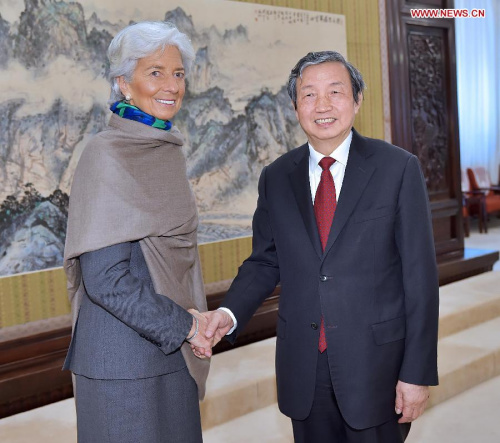

Chinese Vice Premier Ma Kai (R) meets with Christine Lagarde, managing director of the International Monetary Fund (IMF), in Beijing, capital of China, March 23, 2015. (Xinhua/Li Tao)
Despite outside worries that a China-led development bank will challenge the established order of multilateral lenders, the IMF, World Bank and other leading global lenders have welcomed collaboration with the new bank to fill Asia's infrastructure gap.
Speaking at a conference in Beijing on Sunday, IMF Managing Director Christine Lagarde said the fund would be "delighted" to cooperate with the China-proposed Asian Infrastructure Investment Bank (AIIB), designed to provide financing to badly needed infrastructure projects in Asia.
World Bank Managing Director Sri Mulyani Indrawati welcomed the move.
"Any new initiative that will mobilize funding in order to fill the infrastructure gap is certainly welcome," Indrawati told Xinhua in an exclusive interview.
She dismissed worries that the AIIB will compete against the World Bank or existing regional development banks, saying that the global need for infrastructure is huge and the market is large enough to accommodate the newcomer.
Statistics from the Asian Development Bank (ADB) show that between 2010 and 2020, around eight trillion U.S. dollars in investment will be needed in the Asia-Pacific region to improve infrastructure.
The comments from leading multilateral lenders added to a train of support from other countries willing to join the club. So far, the AIIB has 27 prospective founding members, and Britain, France, Germany, Italy, Luxembourg and Switzerland have recently applied.
Jin Liqun, secretary general of the interim multilateral secretariat of the AIIB, expects the number of prospective members to reach 35 by the end of this month, when applications are due.
While most of the world applauded the new bank, the United States has stubbornly opposed, citing concerns over its standards of governance and environmental and social safeguards. Analysts pointed out the country's hidden fear of its financial sway being eroded.
In an earlier interview with Xinhua, China's finance minister Lou Jiwei stressed that the AIIB, rather than being a competitor, will be compatible with established international lenders.
"Historically, the establishment of regional investment banks, including the ADB and the European Bank for Reconstruction and Development, did not weaken established [institutions]. Instead, they reinforced the multilateral financial organizations and pushed forward the global economy more vigorously," Lou said.
He described the bank's founding as a "constructive move" that will complement the current international economic order and enable China to shoulder more global responsibility.
Cooperation is already under way. Indrawati disclosed that the World Bank and the AIIB are already working closely at setting the principles and framework for the new institution.
"By working with us, it's going to show and prove that they (AIIB) are adopting the same principle as other international institutions, for example, like the World Bank," said Indrawati.
ADB President Takehiko Nakao expressed similar confidence, saying the AIIB could help meet infrastructure investment demands in Asia if it can limit the impact on the environment.
The AIIB is expected to be officially established before the end of this year.
Grey Lady‘s sour grapes on AIIB
2015-03-23World Bank welcomes AIIB initiative: managing director
2015-03-23Funding of AIIB will be open to other countries
2015-03-23AIIB to have zero-tolerance for corruption: official
2015-03-23Six Western economies apply to join AIIB
2015-03-21China welcomes Switzerland to AIIB
2015-03-21China calls on countries interested in AIIB to join by Mar 31
2015-03-19Why Europe dismisses U.S. concerns and to join AIIB
2015-03-19France, Germany & Italy agree to join AIIB
2015-03-18AIIB banks on real growth, not rivalry
2015-03-18AIIB offer still open for Japan: finance minister
2015-03-06AIIB to start operations this year
2015-03-05Copyright ©1999-2018
Chinanews.com. All rights reserved.
Reproduction in whole or in part without permission is prohibited.